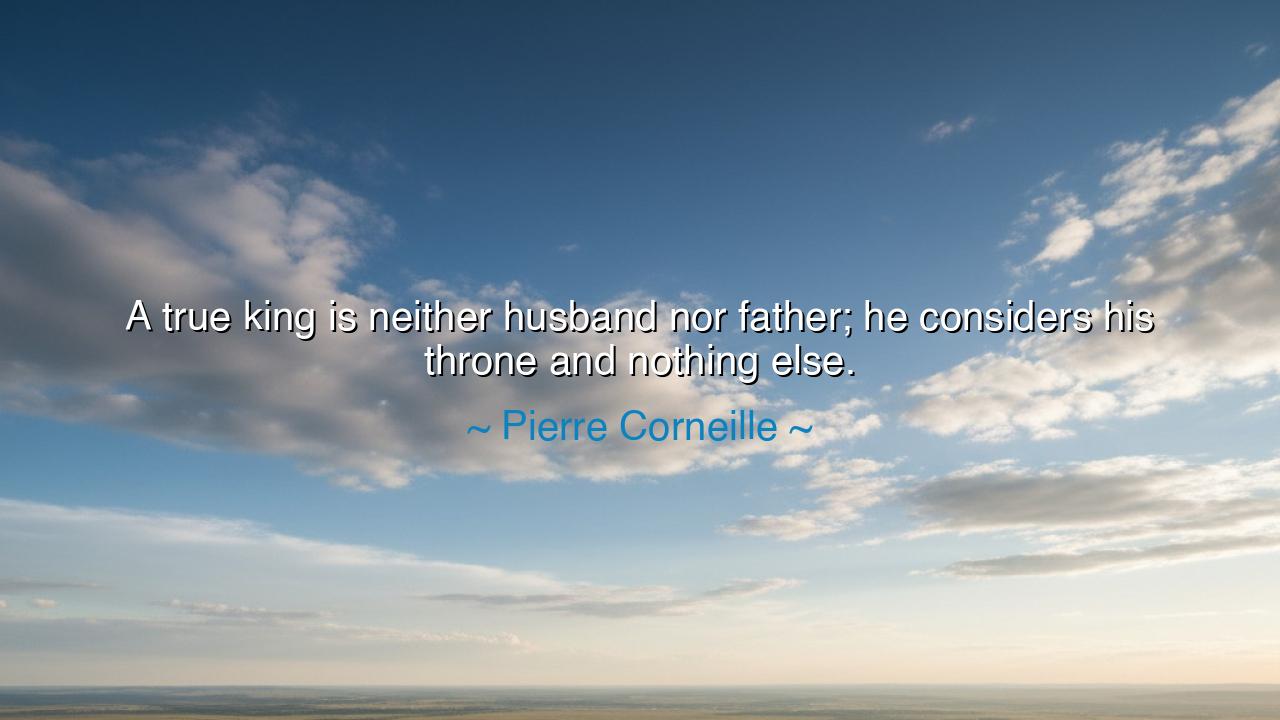
A true king is neither husband nor father; he considers his






O Seekers of True Leadership, hear the words of Pierre Corneille, who speaks of the noble nature of a king’s heart: "A true king is neither husband nor father; he considers his throne and nothing else." In this powerful truth, Corneille calls us to understand that the essence of a true king’s sacrifice lies in his ability to place his duty above all personal ties and desires. A king is bound by the weight of the realm, his mind forever focused on the well-being of the state, not on the comforts of family life or the pursuit of personal pleasure. His throne demands all of his devotion, for the fate of his people rests on his unwavering resolve.
Consider, O Children, the great burden of the king’s office. To be a ruler is to be called to a higher purpose, one that requires sacrifice and discipline. A true king is not swayed by the affections of family or the fleeting pleasures of a personal life; his heart is bound to the realm, his focus forever fixed on the stability and prosperity of his people. It is not that the king is without love or without family, but that he recognizes that his first duty is to his kingdom. His love for his people is greater than his love for his own blood.
Look to the example of Louis XIV, the Sun King, whose reign was marked by his unwavering commitment to the throne. While other monarchs were swayed by personal desires or familial demands, Louis remained ever focused on the glory and stability of his kingdom. He built the magnificent Versailles and ruled with supreme authority, understanding that his throne demanded complete devotion. His personal life, his fatherhood, and his marriage were secondary to his sense of duty. His reign was marked by sacrifice, not personal pleasure, for the weight of the kingdom was his to bear alone.
And so, O Seekers, understand this great truth: the path of true leadership is not the path of personal comfort, but of relentless duty. A king must be prepared to set aside his desires, his emotions, and his personal life to serve the greater good of his people. His throne is not just a symbol of power, but of the great responsibility that demands his undivided attention. It is the sacrifice of personal love for the greater love of the kingdom that defines the true king.
Let us, therefore, understand the nobility of sacrifice in leadership. A king who places his personal ties above the welfare of his people fails in his duty. It is not in the embrace of family or the pursuit of personal glory that true greatness is found, but in the focus on the realm, in the unwavering commitment to his throne. A true leader’s heart must be dedicated to his people—for in that devotion, he becomes not just a ruler, but a beacon of strength, a symbol of selfless duty.






L8Pha Le 8.1
I wonder how Corneille’s view of kingship fits into modern leadership. While it makes sense that a leader must make tough decisions without personal bias, doesn’t this quote propose an almost cold, authoritarian model? Can someone truly separate their role from their personal life, or do family and relationships inevitably influence their actions? How can we reconcile this view of leadership with the growing idea that emotional intelligence and empathy are vital for effective leadership today?
ANAnh Nguyenthivan
Pierre Corneille’s perspective on kingship seems to imply that emotional detachment is key for true leadership. But does this approach work in reality? Isn’t the ability to empathize and connect with others—family, subjects, or advisors—what makes a leader truly effective? If a king ignores personal relationships, does it not risk isolating them from the people they serve? How far can a ruler go without being in touch with their humanity?
HLlai hoang lan
I find this quote intriguing but also troubling. It suggests that the ideal leader is detached from personal relationships, focusing solely on their role. While it might make sense in terms of prioritizing duty, doesn't this perspective overlook the human aspect of leadership? Aren’t the best leaders those who understand and connect with their people, including their families? Can someone truly be a great ruler if they neglect their personal life entirely?
Mminh
This quote seems to suggest that a true leader must prioritize their duty above all else, even family. It’s a rather stark view of leadership, but is it realistic? Can a leader truly separate personal relationships from their responsibilities? Or do we need to acknowledge that being a good leader often involves balancing these roles? In modern times, can we really have a ruler who disregards personal connections for the sake of power?